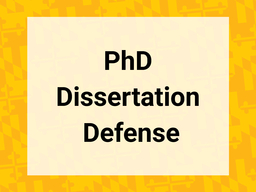PhD Dissertation Defense Announcement: Utsav Shashvatt
Location
Online
PhD Dissertation Defense Announcement: Utsav Shashvatt – Online Event
Date & Time
July 22, 2021, 10:00 am – 11:00 am
Description
Utsav Shashvatt, PhD Candidate
Advisor:
Dr. Lee Blaney
Associate Professor of Chemical, Biochemical, and Environmental Engineering
Title:
Phosphorus recovery from wastewater and solid waste by Donnan dialysis
Abstract:
Phosphorus is a non-renewable resource that is essential for sustaining large-scale food production. At the current rate of phosphorus production, "peak phosphorus" is predicted to occur within 100 years. Concurrently, agricultural practices and waste management approaches promote phosphorus wastage as runoff. These situations highlight the need for sustainable and scalable phosphorus recovery technologies to support the creation of a circular phosphorus economy. This dissertation aimed to develop innovative Donnan dialysis strategies for orthophosphate, or P(V), recovery from wastewater and solid wastes.
Previous Donnan dialysis applications have been limited to wastewater treatment for removal of trace contaminants. However, nutrient-rich wastewater and solid wastes have distinct characteristics, such as the high nutrient, metal, organic matter, and suspended solids contents, that pose major challenges to implementation of selective extraction and recovery processes for P(V). This dissertation addresses those challenges through systematic investigation and optimization of Donnan dialysis systems. In particular, the following aspects of Donnan dialysis-based P(V) recovery were explored: (1) creation of a fundamental framework for Donnan dialysis process optimization to achieve high P(V) recovery; (2) promotion of a novel ligand-enabled Donnan dialysis strategy for recovering recalcitrant P(V) from solid wastes; and, (3) demonstration of the use of alternative draw solutions (e.g., reverse osmosis concentrates) for P(V) recovery as fertilizer products by Donnan dialysis
In the first objective, a fundamental framework was developed to tune draw solution parameters for targeted P(V) removal efficiencies. In particular, the draw solution composition was designed to attain specific equilibrium ratios of the draw ion in the waste and draw solutions, and 90% recovery was achieved for monovalent and divalent P(V) species. The rate of P(V) removal was enhanced by employing formate, rather than chloride, as the draw ion. In the second objective, organic ligands with high affinities for aluminum, such as citrate and ethylenediaminetetraacetate (EDTA), were dosed into a real, alum-laden waste activated sludge (WAS) to enable greater than 99% release of solid-phase P(V). After 300 h of Donnan dialysis, the EDTA and citrate systems provided selective recovery of 45.1% and 25.2% of P(V) from real WAS, respectively. However, the citrate-based approach recovered more P(V) per US dollar (2.65 mol-P USD-1) than EDTA (1.40 mol-P USD-1). In the third objective, brackish water reverse osmosis concentrate was successfully employed as an alternative draw solution for P(V) recovery by Donnan dialysis. In fact, 99.8% and 74.5% P(V) recovery were achieved for wastewater containing 1 and 10 mM P(V), respectively. The recovered P(V) precipitated with calcium and magnesium ions present in the brackish water reverse osmosis concentrate to form hydroxyapatite and struvite, and the form and purity of recovered solids could be controlled through chemical addition.
In summary, this dissertation reports new strategies for the following: (1) optimizing Donnan dialysis parameters to achieve high extents and rates of P(V) recovery; (2) recovering recalcitrant P(V) from complex solid wastes into clean draw solutions for convenient post-processing into P(V)-laden fertilizer products; and, (3) decreasing the operational costs of Donnan dialysis by employing brackish water reverse osmosis concentrate as a sustainable draw solution. Overall, this work highlights the technical, economical, and sustainable advantages of Donnan dialysis processes for P(V) recovery from wastewater and solid wastes, enabling future implementation on the larger scales needed to realize a circular phosphorus economy.
Agenda:
10:00 AM EST - Presentation followed by questions from the audience.
After the questions from the public, the meeting will be closed for the committee discussion.
WEBEX Information: (see link above)
Meeting number: 120 930 3919
Password: dMfNJjUf386
Join by phone
+1-202-860-2110 United States Toll (Washington D.C.)
Access code: 120 930 3919
Tags:
